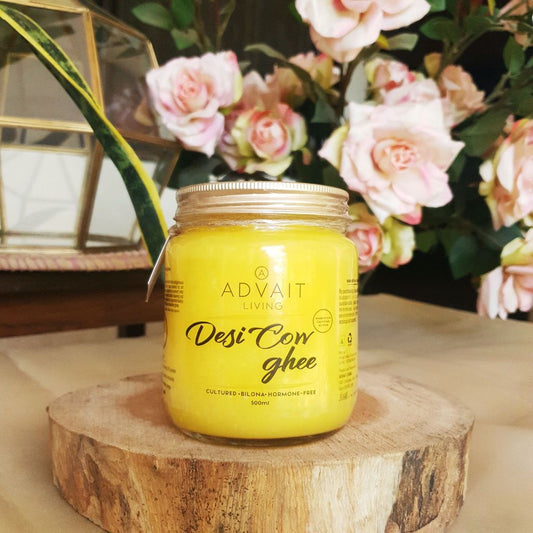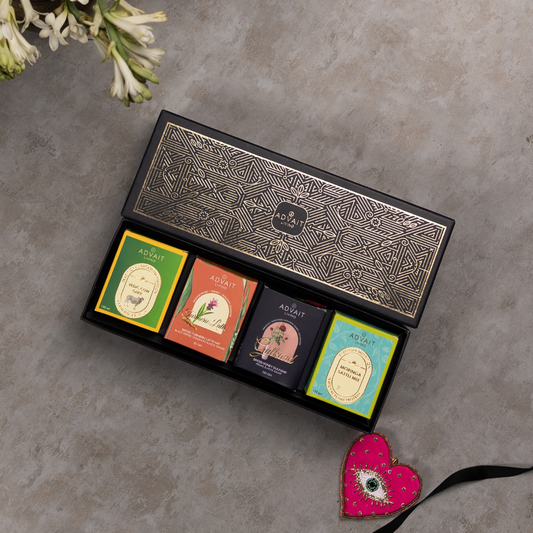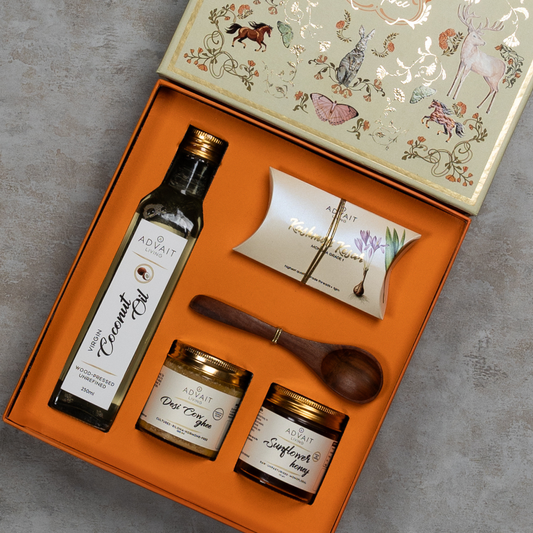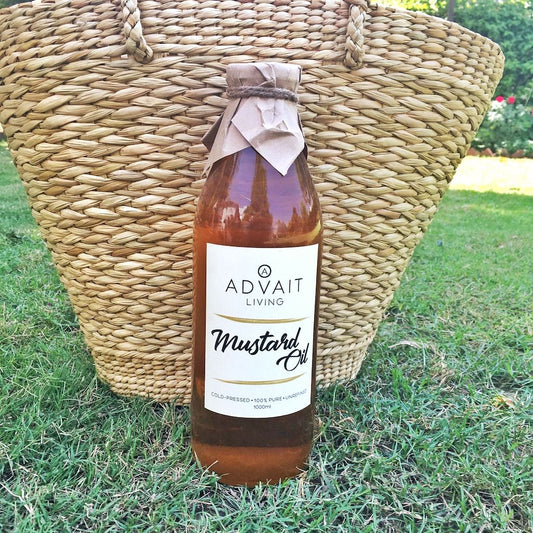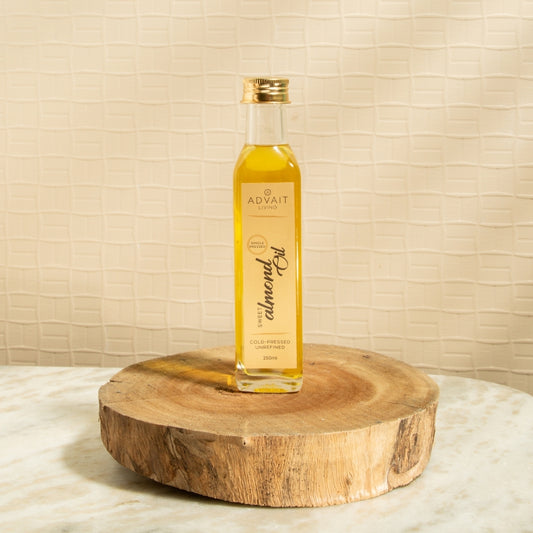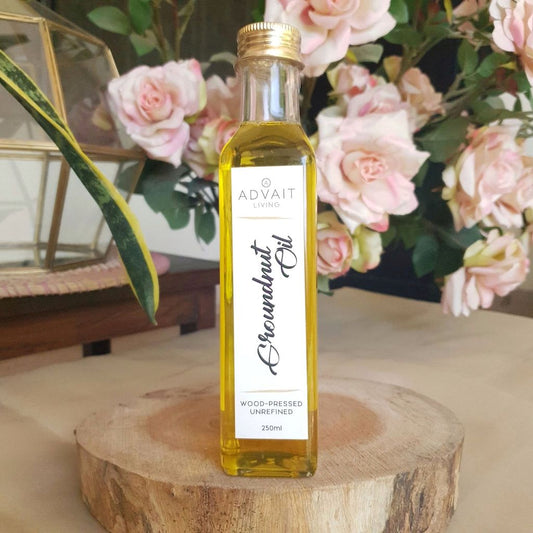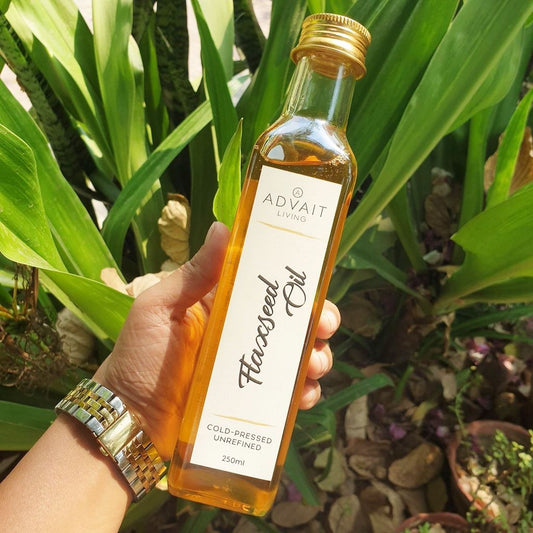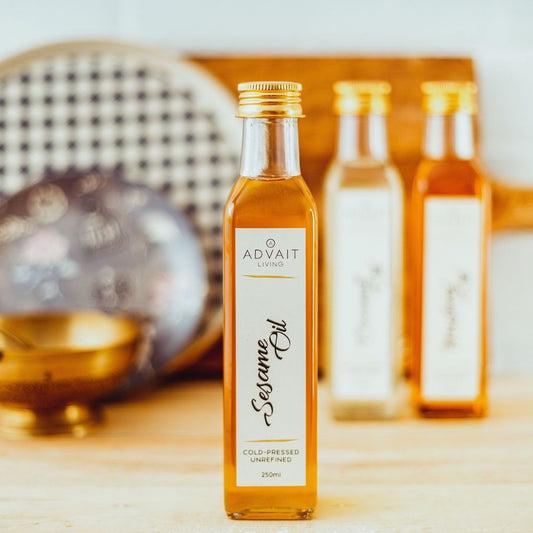In recent years, there has been a growing interest in traditional and naturally prepared desi cow ghee. Known for its rich flavour and therapeutic properties, desi cow ghee has been an integral part of Indian cuisine and Ayurvedic medicine for centuries.
Here are 8 incredible health benefits of Desi Cow Ghee and how you can incorporate it into your diet.
What is Desi Cow Ghee?
Ghee is 99.8% milk fat and is actually a superfood. Desi Cow Ghee is made from the milk of indigenous cow breeds found in India. It is prepared by simmering butter obtained from cow's milk and removing all milk solids from butter to get delicious and aromatic natural fat called “desi cow ghee”. The process of making this ghee involves slow heating, which gives it a unique nutty aroma and a golden colour.
India has many indigenous cows that are native to India and include breeds like Gir cows (originally from the Gujarat belt), Tharparkar (originally from the Thar desert), Sahiwal (originally from Punjab), Hallikar (originally from Karnataka), Rathi (originally from Rajasthan), among others. The population of these cows have been dwindling for many years with the introduction of buffalo and Jersey cows to India.
In recent years, desi cows have made a comeback and gained prominence as more Indians understand the benefits of these cows in our farming and food systems.
Nutritional Composition
Ghee is 99.8% milk fat and is actually a superfood. Chemically, ghee is a complex lipid of glycerides (usually mixed), free fatty acids, phospholipids, sterols, sterol esters, fat soluble vitamins (A, D, E, and K,), carbonyls, hydrocarbons, carotenoids (only in ghee derived from cow milk), small amounts of charred casein and traces of calcium, phosphorus, iron, etc.
It also has long-chain fatty acids, medium-chain fatty acids and even short-chain fatty acids. Ghee is also one of the rare foods that has Omega-3, Omega-6 6 and Omega-9. It has many health benefits, including improved gut health. (1)


Source of nutritional charts. (2)
Eight Health Benefits of Desi Cow Ghee
Consuming desi cow ghee offers a wide range of health benefits, and including it in your diet is a must:
1) Boosts Digestive Health
Unlike buffalo milk, cow milk is easier to digest. Hence, ghee made from cow milk is easy to digest. Fermented ghee or cultured ghee, that is, ghee made from the Vedic bilona method (made from curd and bi-directional churning of curd), is the easiest to digest. This is due to the presence of lactic acid (instead of lactose). The fermentation process converts the lactose molecule present in milk to lactic acid, which is easy to digest by the small intestine instead of being pushed into the large intestine. The lactic acid present in this ghee aids the digestive system and also helps maintain a good metabolism of the body.
Moreover, desi ghee can also stimulate the secretion of digestive enzymes, which aid in the breakdown and absorption of food. Additionally, the butyric acid present in ghee helps nourish the cells lining the digestive tract, reducing inflammation and supporting overall digestive health.
2) Enhances the Immune System
Ghee enhances and boosts the immune system due to the presence of varied nutrients in it. Grass-fed ghee from desi cows generally offers a higher quantity of nutrients, including omega-3, conjugated linoleic acid, butyrate, vitamins A, D, E & K, minerals such as natural iodine, phosphorus, potassium, etc. These nutrients help strengthen the body's defence mechanisms, protect against harmful pathogens, and promote the production of white blood cells that fight off infections.
3) Supports Healthy Weight Loss
Contrary to popular belief, A2 cow ghee or desi cow ghee can actually aid in weight loss when consumed in moderation.
- Ghee is packed with healthy saturated fats that help induce a feeling of satiety and reduce unnecessary food cravings.
- Moreover, studies show that the conjugated linoleic acid (CLA) found in bilona ghee has been associated with increased fat burning and weight loss.
- Grass-fed ghee is also a good source of natural iodine, which improves thyroid health, which directly affects your metabolism.
4) Improves Heart Health
Studies (3) after studies are now showing the importance of consuming healthy saturated fats that are minimally processed for improved heart health. Gir ghee or A2 desi cow ghee is one such minimally processed farm produce that is not made in factories and contains naturally occurring omega-3 fatty acids that are good for your heart and blood vessels in several ways.
- Strong evidence (4) shows that Omega-3 reduces triglyceride levels in the body.
- Long-chain omega-3s also reduce plaque formation in the arteries. (5)
- Studies (6) show that higher amounts of omega-3 diet can reduce blood pressure in people with hypertension.
Moreover, Gir cow ghee or bilona ghee is also a rich source of healthy cholesterol that our body needs for making new cell membranes, many hormones, and even Vitamin D. The presence of good cholesterol is also important for improved heart health.
5) Promotes Brain Function
As per Ayurveda, Vedic bilona ghee is considered a ‘medhya rasayana’. Medhya Rasayana is a group of nootropic herbs (i.e. cognition-enhancing) that has multi-fold benefits and especially helps in improving mental alertness, cognition, memory, intelligence and even the power of retention and acquisition.
Desi cow ghee contains essential fatty acids that are vital for brain health. These fatty acids help in the development and maintenance of brain cells, improving cognitive function, memory, and focus. Regular consumption of A2 cow ghee may also reduce the risk of neurodegenerative disorders like Alzheimer's disease.
6) Good for Eyes
Ghee has lutein, a carotenoid essential for good eye health. Lutein reduces age-related macular disease, which is the leading cause of blindness and vision impairment. It may also reduce dry-eye syndrome, in which your eyes don’t make enough lubricant to protect your eyes.
Ghee also has Vitamin A, which is crucial for the production of photoreceptors, a photopigment found in rod cells of the retina. This is especially helpful in allowing our eyes to see at night.
Ghee is also packed with antioxidants that moisturise our eyes, reduce dark circles, wrinkles and inflammation.
7) Aids in Skin and Hair Care
Vedic ghee and even medicated ghee have been used for healing wounds, improving skin and hair health for centuries.
Nutrient-rich ghee is loaded with antioxidants that scavenge free radicals in the body and help reduce oxidative stress. Oxidative stress in skin plays a major role in ageing, impacts collagen formation, lipid damage that leads to acne and even skin-cell damage leading to skin cancer. Reducing oxidative stress is crucial for improved skin health and youthfulness.
Gir ghee or desi ghee also has regenerative properties and helps heal wounds. It has been used in Ayurveda for centuries for its medicinal properties.
With its essential vitamins A, E, and D, ghee is known to help maintain our skin's elasticity and is a natural moisturiser that helps nourish the skin, making it soft, supple and radiant. When applied to the hair, ghee can condition and revitalise dry, damaged strands, promoting lustrous and healthy-looking hair.
8) Helps in Detoxification
Desi Cow Ghee possesses detoxifying properties that aid in eliminating toxins from the body. It helps cleanse the liver and supports its proper functioning. Regular consumption of ghee can assist the body in eliminating waste products, promoting a healthy and efficient detoxification process.
How To Incorporate Desi Cow Ghee Into Your Diet?
Incorporating desi cow ghee into your diet is easy and can add a flavourful twist to your meals. You can use it for sautéing vegetables, frying, baking, or as a spread on bread or toast. Additionally, you can drizzle ghee over cooked rice, dals or soups to enhance their taste and nutritional value. Remember to use ghee in moderation as it is calorie-dense. Try out our indigenous A2 desi cow ghee.
Conclusion
Desi Cow Ghee is not just a culinary delight. It also offers numerous health benefits. From improving digestion and boosting the immune system to promoting brain function and heart health, ghee has proven its worth as a versatile and nutritious ingredient. By incorporating desi cow ghee into your diet mindfully, you can enjoy its incredible advantages while savouring the rich flavours it brings to your meals.
Check out our farm store for more such organic products and value deals.
FAQs:
Q1. What is the difference between A2 Cow Ghee and Desi Cow Ghee?
Ghee made using only certified A2 cow milk is called A2 Cow Ghee and has only A1 protein present. Regular ghee, on the other hand, may be made from mixed milk of different cattle, including cows, buffalo, camel, goat, etc, and it does not guarantee the exclusion of A1 protein.
Know more about A2 ghee and regular ghee.
Q2. Is Desi Cow Ghee suitable for lactose-intolerant individuals?
Desi Cow Ghee made using the Vedic bilona ‘cultured’ method is lactose-free, as the process of making ghee involves removing the milk solids. This makes it suitable for lactose-intolerant individuals.
Q3. Can Desi Cow Ghee be used by people with cholesterol issues?
Desi cow ghee is an excellent source of good cholesterol that your body needs. It helps in the production of HDL and may lower VLDL. Consider including a moderate amount of bilona ghee daily in your diet.
Q4. Is Desi Cow Ghee suitable for vegans?
Desi Cow Ghee is a dairy product made from cow's milk, so it is not 100% suitable for vegans. However, the lactose molecule (milk) is 100% removed from cultured ghee (dahi-ghee), so some people with milk allergy can consider adopting it. Vegans can also explore plant-based alternatives like cold pressed oils instead of ghee.
Q5. Can desi ghee be used for external applications?
Yes, desi cow ghee can be used topically for moisturising the skin and conditioning the hair. Its natural properties make it a great addition to your skincare and haircare routines.









